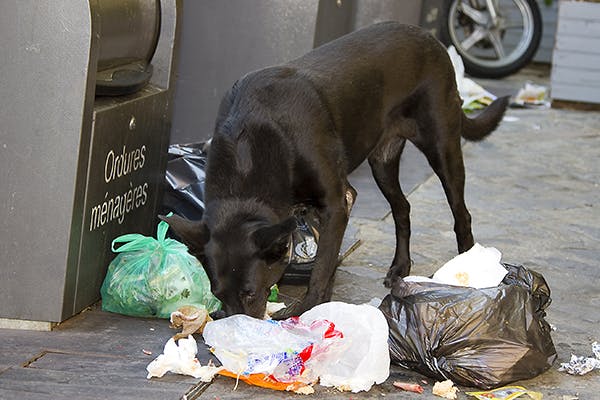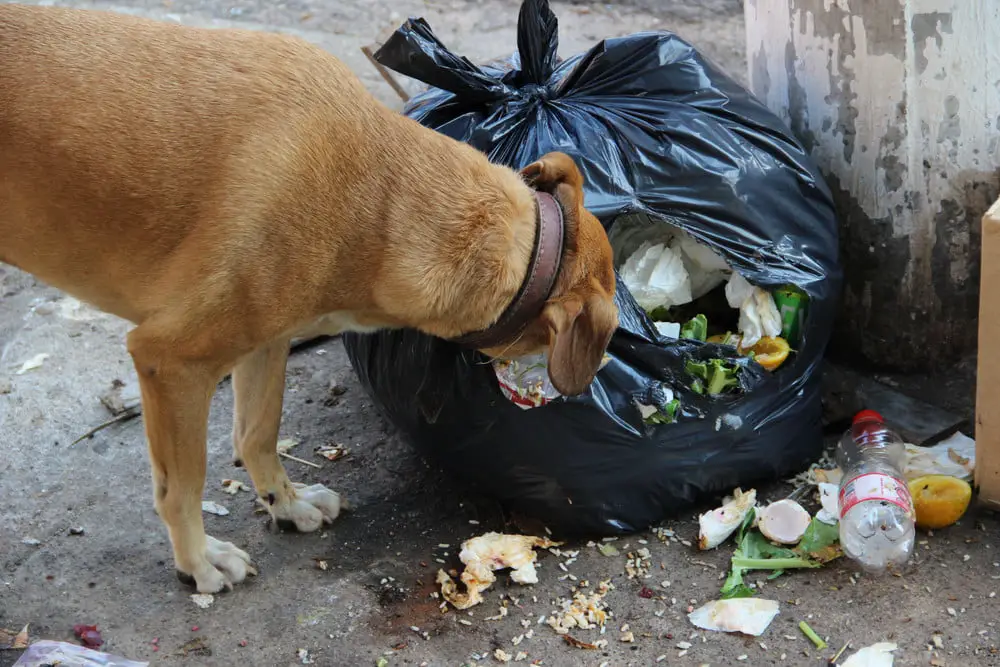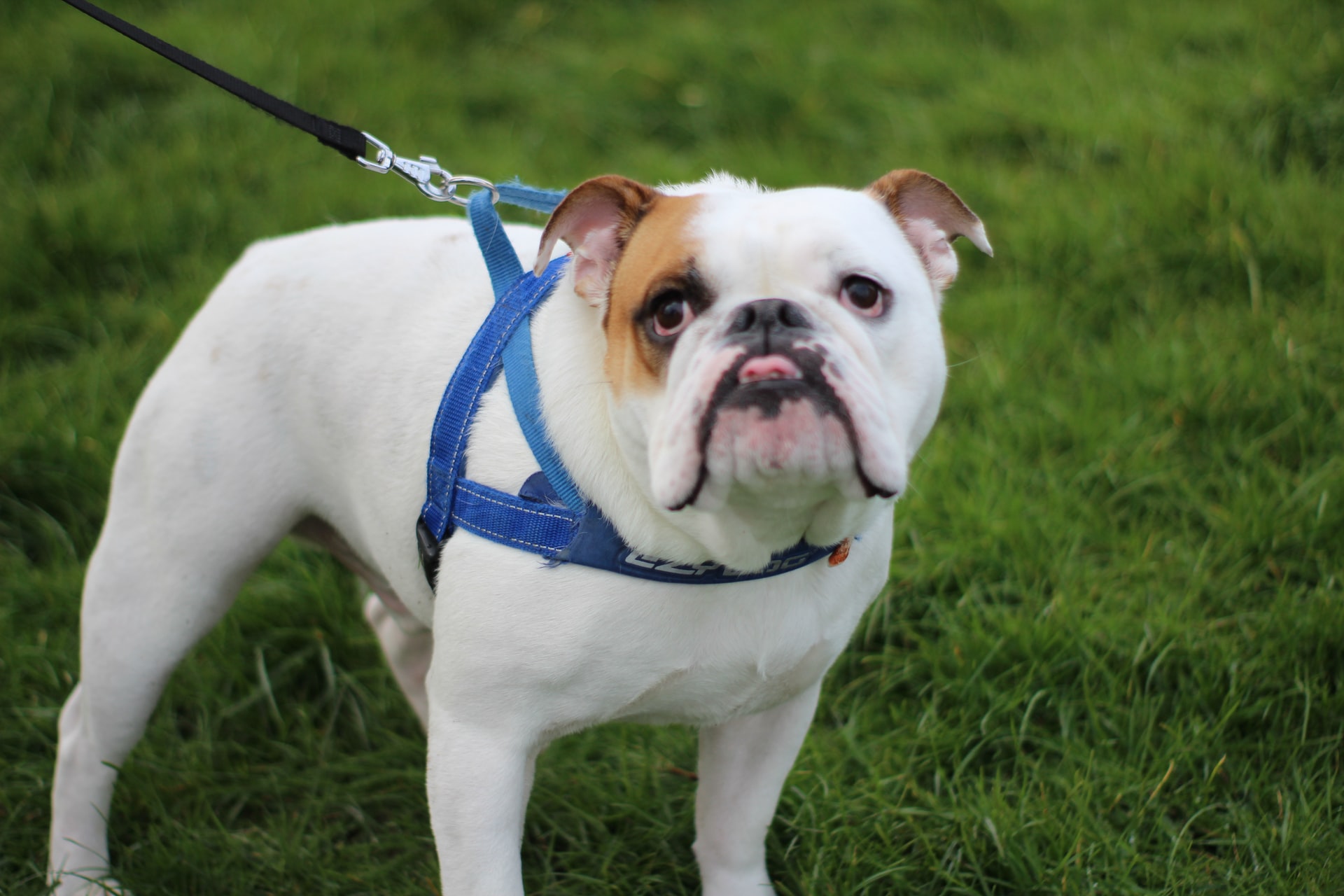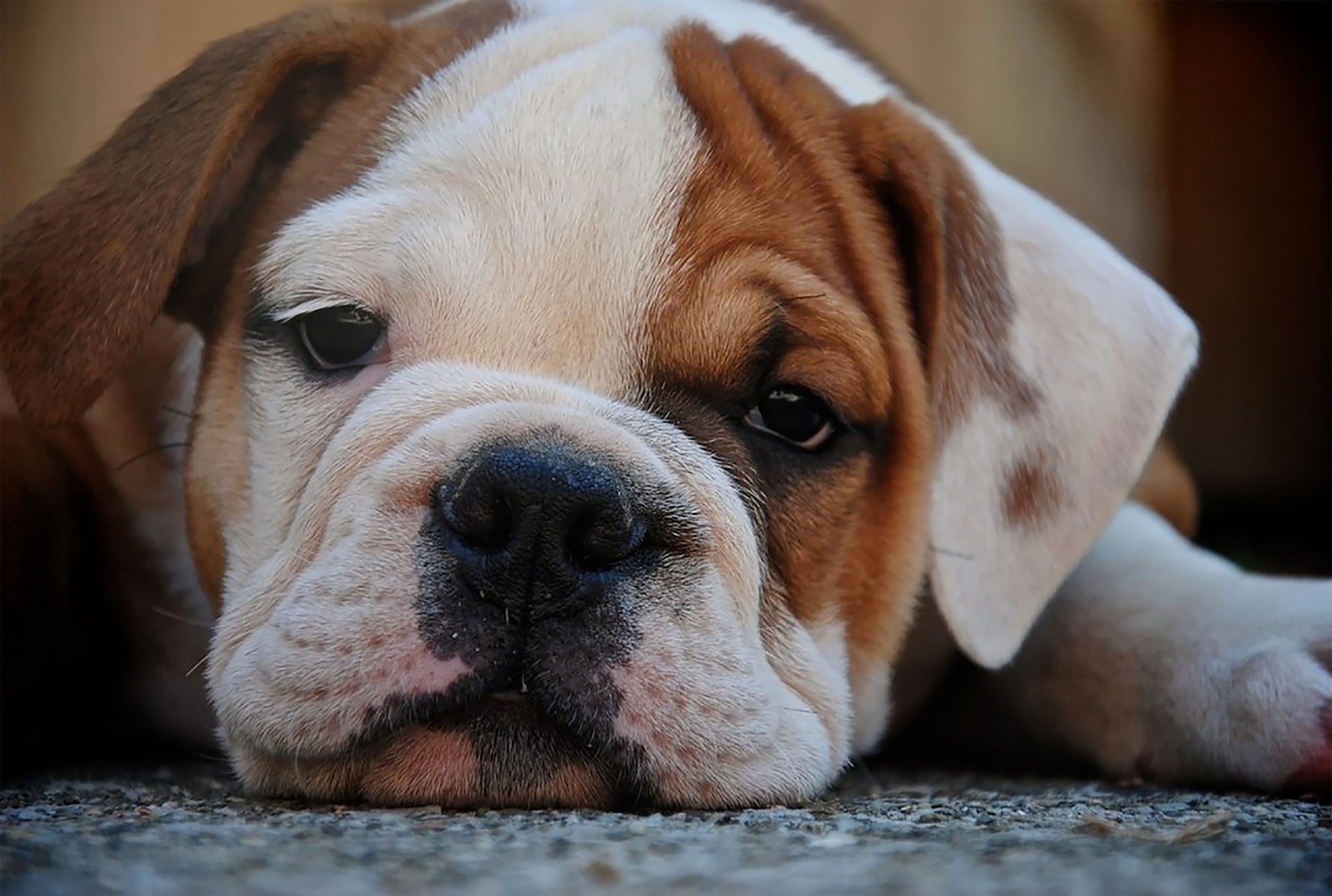No matter how well-fed, dogs will still dumpster dive and eat whatever they can find in the trash. This is a natural instinct in order to survive in the wild. However, this unhealthy habit can put a canine’s life at risk. This is why pet owners should know how to treat garbage gut in dogs at home before it leads to a serious case of poisoning.
Dogs are notorious for their dietary indiscretion. They will try to eat just about anything that they find palatable – from their warm meals to spoiled leftovers in the trash.
This obsession can lead to a condition called ‘garbage gut’. While it may seem like a typical case of stomach upset, this condition can have a fatal consequence if not addressed immediately.
Below, I discussed this problem and what you can do about it. Also, I added tips on how to fix garbage gut in case your dog is suffering from it.
What is garbage gut in dogs?

Garbage gut is also known as garbage toxicosis. This condition happens when a dog eats unsafe substances from the trash. It could be spoiled food, dead animals, toxic waste, and so on. And since garbage is reeking of bacteria and germs, even the strong digestive system of canines can’t stand its wrath.
The likes of E. coli, salmonella, streptococcus, and staphylococcus are found in garbage bins. If your dog ingests any of the contaminated items inside the trash, it will likely suffer from an explosive digestive irritation.
Also, wild animals scavenge on garbage bins, leaving behind bacteria and transmissible diseases. For example, raccoons, also monikered ‘dumpster panda’, can leave Leptospira bacteria in trash bins. This is transmissible to both dogs and humans.
Moreover, garbage gut is more common among outdoor dogs since they have easier access to garbage. While indoor dogs can still forage in your kitchen bin, it’s not as dirty as the ones located outdoors.
However, you should know that garbage gut can still happen even if your dog doesn’t have access to a trash can. Feeding raw and contaminated food as well as table scraps can also trigger the same symptoms of garbage toxicosis.
Aside from that, fatty and spicy food can also lead to a condition similar to garbage gut. Also, breeds with a higher predisposition to pancreatitis are more likely to suffer from this problem.
Even though dogs are known to have a tolerant digestive system, their stomachs aren’t cast iron. Contaminated and inedible items can still make them sick.
Symptoms of garbage gut in dogs
Dogs suffering from garbage gut will always exhibit a series of digestive symptoms. Here are a few that you should watch out for:
- Diarrhea
- Vomiting
- Gut pain
- Grumbling stomach
- Excessive flatulence
- Lethargy and quiet behavior
- Poor appetite
If your dog ate through your garbage and experiences some of these symptoms, it’s important to act right away. The severity of the garbage gut may vary, depending on the specific substance your dog consumed.
Basically, if your dog’s diarrhea and vomiting aren’t going away for 24 hours, you should rush it to the vet’s clinic right away. If not poisoning, your biggest enemy at this point is dehydration.
Whether your dog has a garbage gut or not, diarrhea and vomiting should always be taken seriously. In the end, you’ll save a lot more money if you get your dog checked as the symptoms arise.
Why do dogs like garbage?

As humans, it doesn’t seem sensible why dogs would want to eat garbage. After all, garbage is stinky, dirty, and likely foul-tasting. However, canines tend to have a different take on it.
For dogs, the strong smell of trash is inviting. Since canines have a strong sense of smell, they can easily tell if the garbage has food in it. This is why canines will try to get through the garbage just to snack on whatever leftover is found in the trash.
Also, boredom can push a dog to dumpster dive. Since there’s nothing to occupy their time, canines will explore around and divert their energy into eating anything they can find in the garbage bin.
Lastly, some dogs suffer from a condition called ‘pica’. Pica is a condition in which canines – and even humans – consume inedible items. It could be garbage, socks, shoes, toys, drywall, and just about anything. Take note that pica can be life-threatening, so it’s important to address it right away.
How to treat garbage gut in dogs at home
If your dog is suffering from garbage gut, you can do the following steps to treat the problem:
🐶Fasting mode
The first thing you have to do is give your dog’s gut a break. The moment you notice symptoms of garbage gut, you should put your dog on a fasting mode. This is to allow its digestive symptom to flush out the toxins without putting too much work on it, a.k.a. feeding a large meal.
If you’re worried that your dog will starve and weaken, you can switch it to a bland diet in the meantime. You can serve cooked rice and boiled chicken instead of its regular kibble. This meal is easier to digest and will help calm your pet’s digestive tract.
Remember to give this bland diet in small servings as you wouldn’t want your dog to gobble down a large meal while it’s suffering from a problematic gut.
🐶Intravenous fluids
If your dog’s vomiting and diarrhea aren’t going away, the next best move is to bring the pooch to the vet. This way, your doggo will be given intravenous fluid to detoxify its body from the toxins it got from eating garbage.
Aside from detoxification, the intravenous fluid will also replace lost fluids due to non-stop diarrhea and/or vomiting. It’s the only way to hydrate a dog if it’s no longer accepting water orally.
Depending on the severity of your dog’s garbage gut, it may need to stay in the vet’s clinic overnight. Meanwhile, other canines can go home on the same day.
Moreover, the veterinarian may also provide an anti-emetic to stop your dog’s vomiting. Gut protectors are also commonly used to treat stomach irritation due to garbage gut and to prevent further damage to the canine’s tummy.
🐶Antibiotics
Dogs suffering from chronic garbage gut may need antibiotics to combat infection. The vet will usually prescribe this if the canine is dealing with life-threatening levels of harmful bacteria on its GI tract.
Take note that antibiotics should only be given to dogs under the prescription of a veterinarian. Also, you should observe the right dosage and duration to ensure its efficacy.
🐶Monitoring
The last step of treating the garbage gut is monitoring your dog. In most cases, the canine will recover within 1 to 3 days. If your pet’s condition seems to be worsening, you should call the vet right away.
It’s possible that your pet needs a different treatment approach or its garbage gut is worse than initially diagnosed.
What NOT to do if your dog has a garbage gut
Many pet owners are oblivious of potential mistakes they might commit when dealing with garbage gut. To ensure that you won’t fall into the same errors, you should keep the following in mind:
❌Never force your dog to vomit

You should never force your dog to vomit because of two things: the garbage has been far down its GI tract and second, it can do more harm than help.
If it’s been hours since your dog ate garbage, inducing vomiting is no longer helpful. Worse, it will only drain the fluids on your dog’s tummy, which can cause more irritations. Also, forcing a dog to vomit may cause choking, which is far more life-threatening.
Overall, if you’re thinking of inducing vomiting on your dog, you should consult the veterinarian first. This way, the vet can guide you on the proper way to do it and whether it’s safe to perform based on your dog’s condition.
❌Don’t punish your dog
If you caught your dog in the act of dumpster diving, punishment isn’t the answer. This negative reaction will not stop your pet from eating garbage in the future.
Instead, you should train your dog to leave the garbage bin alone. Limiting its access to your kitchen, bathroom, and outdoor areas are also a better response.
Besides, dogs don’t understand anger and punishment. In the long run, your harsh way of disciplining may trigger aggression tendencies on the part of the dog.
❌Never self-medicate your dog
Some pet owners go to great lengths just to avoid paying vet fees. Others will self-medicate garbage gut at home, only to make things worse in the end.
Take note that serious cases of garbage gut can only be treated through IV fluids, anti-emetics, and antibiotics. All of these are only legally available at the vet’s clinic and must be prescribed/administered by a licensed veterinarian.
❌Never dismiss garbage gut
Garbage gut may seem like a random case of vomiting or diarrhea in dogs. However, unlike the latter, garbage gut can be life-threatening if not treated right away.
Aside from dehydration, your dog may die from the toxic substances and bacteria in the garbage it consumed. Also, intestinal blockage may occur if the canine ingested inedible items like plastic bags, cleaning wipes, paper cups, and so on.
It’s important for your dog to see a veterinarian as soon as possible, especially if its symptoms aren’t going away.
How to prevent your dog from dumpster diving
Prevention is always the best cure for garbage gut. It’s best to be proactive to save your pet from unnecessary discomfort and suffering.
Here are some of the preventive measures you can take:
✔️Cover up your garbage bins

The first thing you have to do is make sure that your dog won’t access your garbage bins. You should switch to trash bins with lids, so it will trap the smell inside and your dog won’t be able to dive into them.
Aside from that, you should place your trash can away from your dog’s reach. If this isn’t possible, you should limit your dog’s access around the house, especially in the kitchen and bathroom.
✔️Provide an alternative activity
Some dogs dumpster-dive out of boredom. You can prevent this from happening by offering an alternative activity like chew toys, treats, and so on.
It will also help a lot if you drain your pet’s excess energy. This is where daily walks and regular exercise come in. Still, the physical activity of your pet must be suitable for its breed, especially if you have a Bulldog that’s prone to overheating.
✔️Don’t throw leftover food in the trash
Dogs are often attracted to leftovers thrown into the garbage bin. As much as possible, you should dispose of leftovers differently.
You have the option to use your garbage disposal or your mulch. For the latter, make sure that your dog doesn’t have access to it.
If it’s unavoidable to throw away food leftovers, you should place them in a plastic bag and tie the ends. This will prevent the smell from emanating and being detected by a hungry doggo.
✔️Feed your dog well
Poor nutrition can also be the reason why some dogs resort to garbage when they are hungry. It’s best to come up with a feeding schedule, so your dog will get used to it. Aside from that, you should provide treats in between meals to augment your pet’s hunger.
Take note that some dogs have an insatiable appetite. For example, a Bulldog will keep begging for food even if it already finished a meal. In this case, it will help to divide a day’s worth of food into four or more servings.
✔️Train your dog
Dogs are generally receptive to training, so it’s possible to teach your pet not to mess with the trash can. You can also teach your dog to respect boundaries around the house.
For example, if your dog starts to sniff or lick your trash can, you can call its name and say a firm ‘no’. If the pooch comes to you, make sure to give a reward. This will teach your pet that leaving the trash can alone is a rewarded response.
✔️Make the trash bin unpleasant
Another way to stop your dog’s dumpster diving is by making the garbage bin unpleasant to the senses. You can spray your garbage with bitter apple, so if your dog tries to chew it, the awful taste will put him off.
You can also use lemon juice if bitter apple isn’t available. The best thing about this method is that lemon juice is also a good deodorizer for stinky trash bins.
Frequently Asked Questions
Q: How long does garbage gut last in dogs?
A: Garbage gut in dogs can last for up to 72 hours. However, during this point, adverse symptoms may start to surface. It’s important to bring your dog to the vet if symptoms of garbage gut don’t subside within 24 hours. You should do the same if your pet’s diarrhea has traces of blood.
Q: Do dogs outgrow dietary indiscretion?
A: Dietary indiscretion is common among canines. However, it doesn’t guarantee that they will outgrow this naturally. Training is necessary to ensure that your pooch will not resort to dumpster diving throughout its lifespan. Also, you should remove any inedible items that your dog may try to chew or consume.
Q: Why does my dog go through my bathroom garbage?
A: Bathroom garbage is one of the nastiest trash, but some dogs tend to have an affinity for it. The strong smell is often a giveaway for curious doggos. Overall, boredom, anxiety, and craving for attention are the reasons why dogs tend to dumpster dive into your bathroom trash bin.
Q: How long after eating something will a dog get sick?
A: Dogs will start showing signs of stomach upset at least 8 hours after eating something unpleasant. However, if the canine consumed a highly toxic substance, symptoms may show faster. It also depends on the canine’s breed and overall health condition. In general, you shouldn’t wait for your dog’s condition to get worse before you do something.
Q: Should you induce vomiting in dogs after it eats garbage?
A: You should never induce vomiting in dogs unless you’re supervised by the veterinarian. It’s because forcing your dog to vomit can end up in blockages along its throat. Also, if done improperly, your dog may suffer from aspiration pneumonia if the vomit gets into the lungs instead of the mouth.
Q: How come my dog can eat garbage and not get sick?
A: Just because your dog isn’t sick after eating garbage doesn’t mean it’s fine. Take note that some dogs have a higher pain tolerance, which makes them appear normal even if they’re already suffering from mild to moderate discomfort. Also, you shouldn’t wait for your dog to get sick before you stop such behavior.
Final words
Knowing how to treat garbage gut in dogs at home is a lifesaver knowledge. Just remember that you should always involve the vet in the process, especially if your dog’s condition isn’t improving within 24 hours.
After your dog recovers, it’s important to observe preventive measures. A combination of training and adjustments to your household will be a big help.

